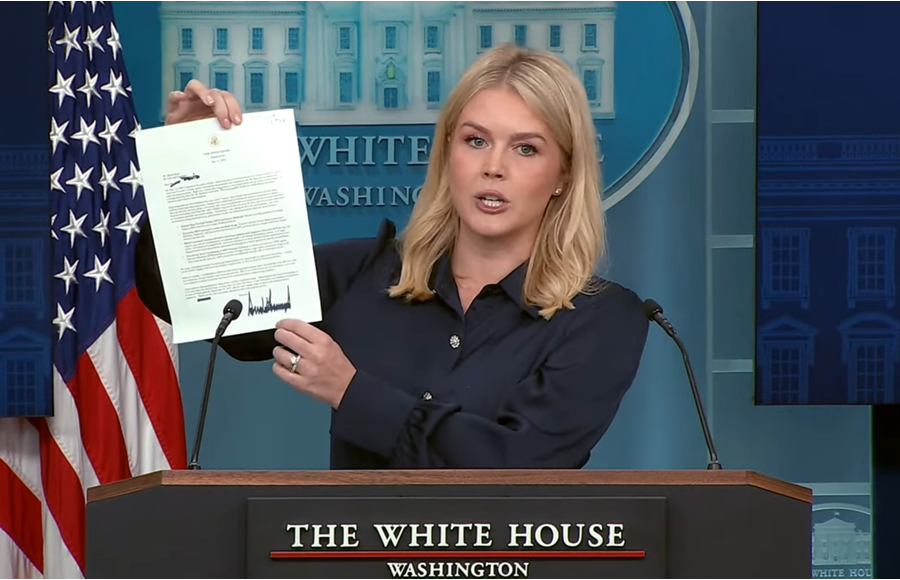
WASHINGTON, D.C. – In an aggressive move to slash the cost of prescription medications in the United States, the Trump administration has sent formal letters to 17 top pharmaceutical companies demanding they reduce U.S. drug prices within 60 days – or face regulatory consequences.
The letters, addressed to CEOs of major drug manufacturers including AbbVie, Pfizer, Johnson & Johnson, Merck, Sanofi, and Gilead, cite the administration’s newly issued Executive Order 14297, Delivering Most-Favored-Nation Prescription Drug Pricing to American Patients. Signed on May 12, 2025, the order aims to ensure that Americans pay no more than the lowest prices charged for the same medications in other developed countries.
Each company was instructed to commit by September 29, 2025, to a series of policy shifts, including:
- Applying Most-Favored-Nation pricing to all drugs covered by Medicaid;
- Extending MFN pricing guarantees to newly launched drugs across Medicare, Medicaid, and commercial insurers;
- Repatriating overseas profits derived from higher foreign pricing back to the benefit of U.S. patients and taxpayers;
- Offering select drugs at MFN pricing through direct-to-consumer or direct-to-business channels.
The letters warn that companies unwilling to cooperate may face “regulatory, enforcement, and trade-based measures” as well as expanded drug importation programs designed to undercut domestic prices.
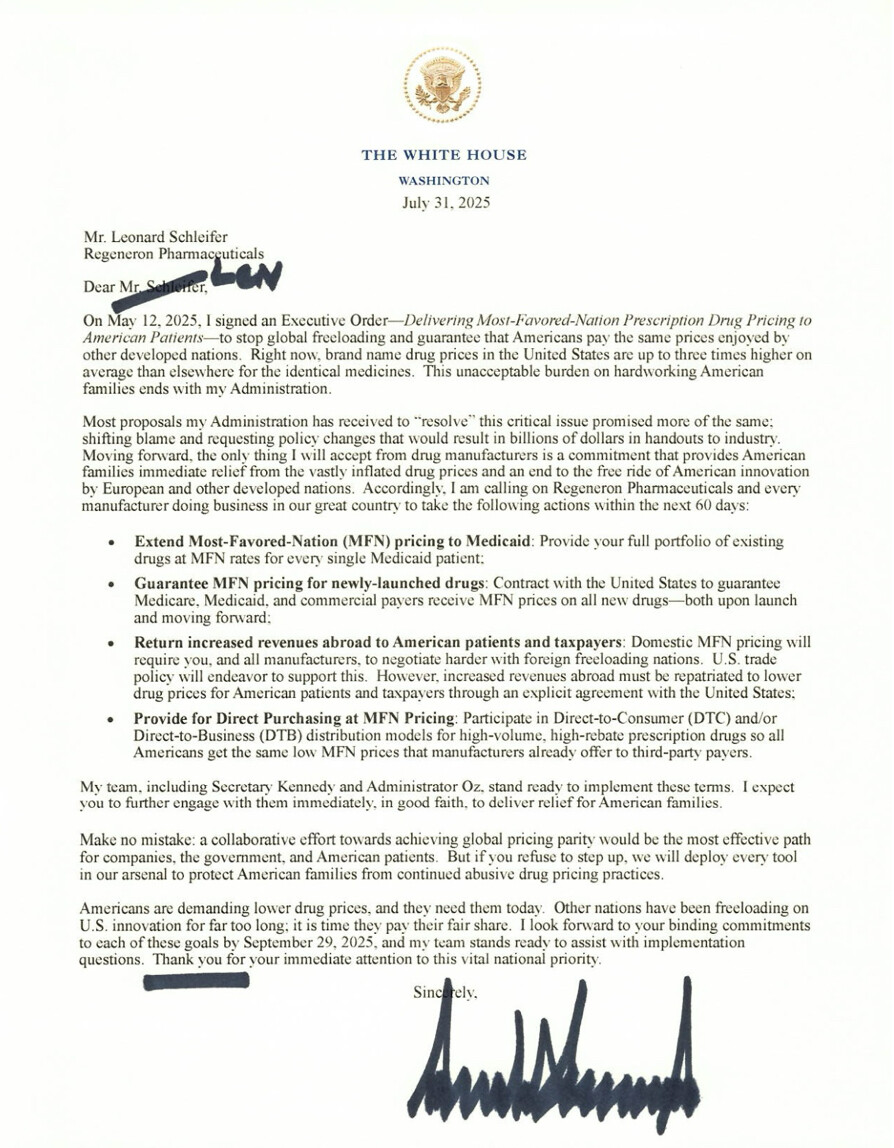


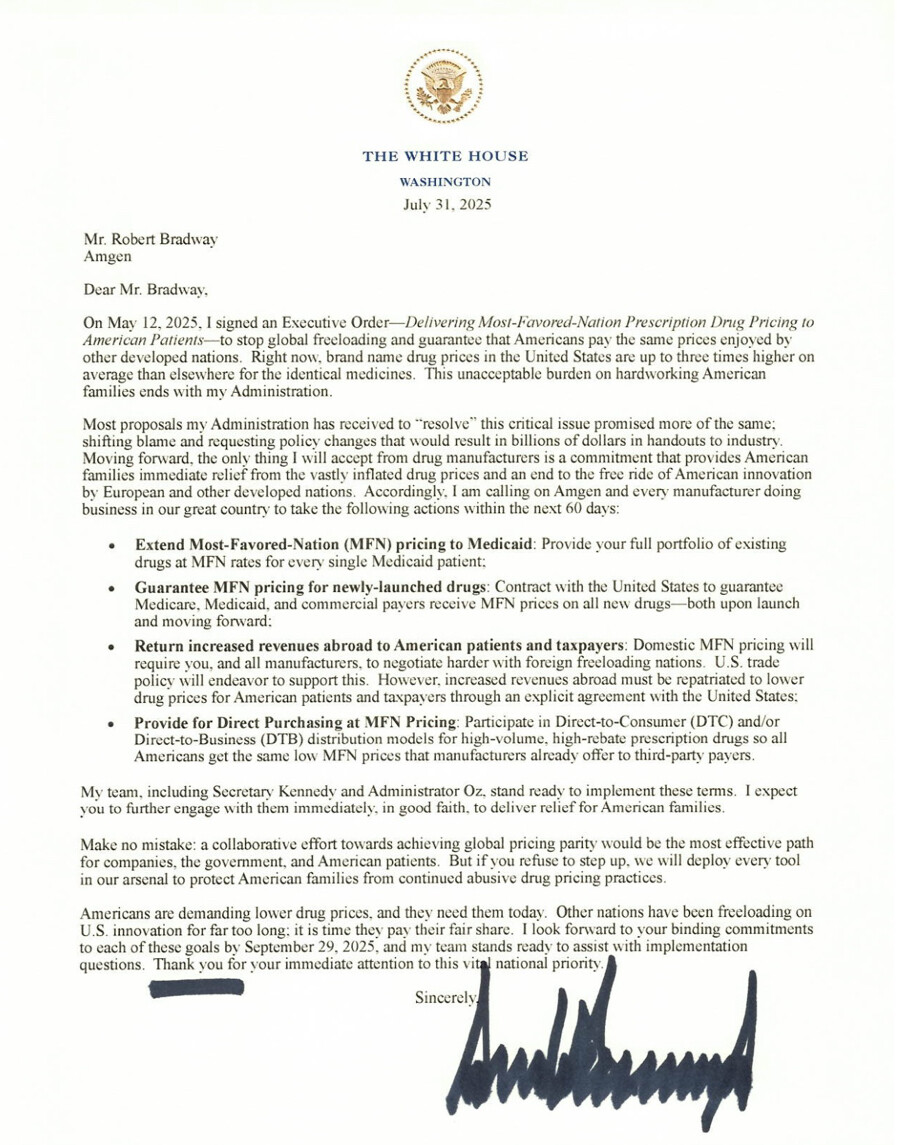

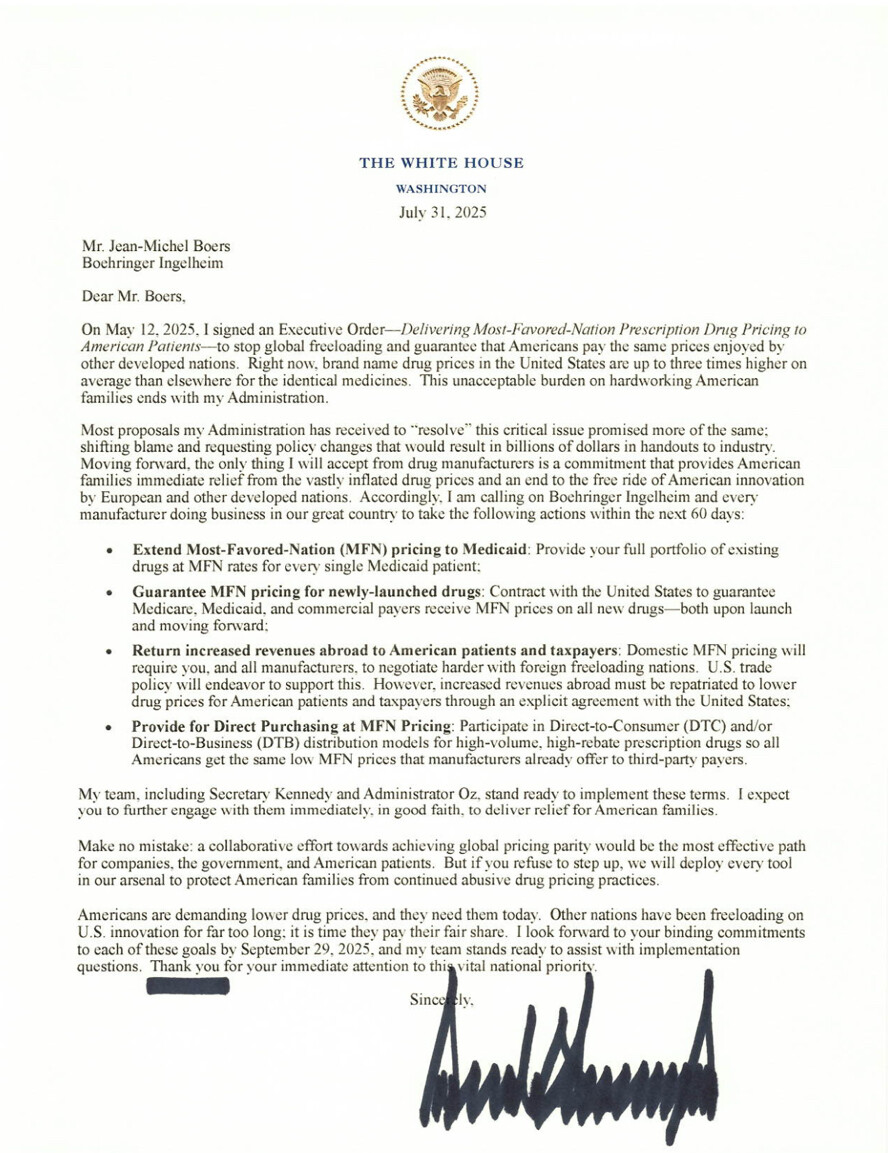

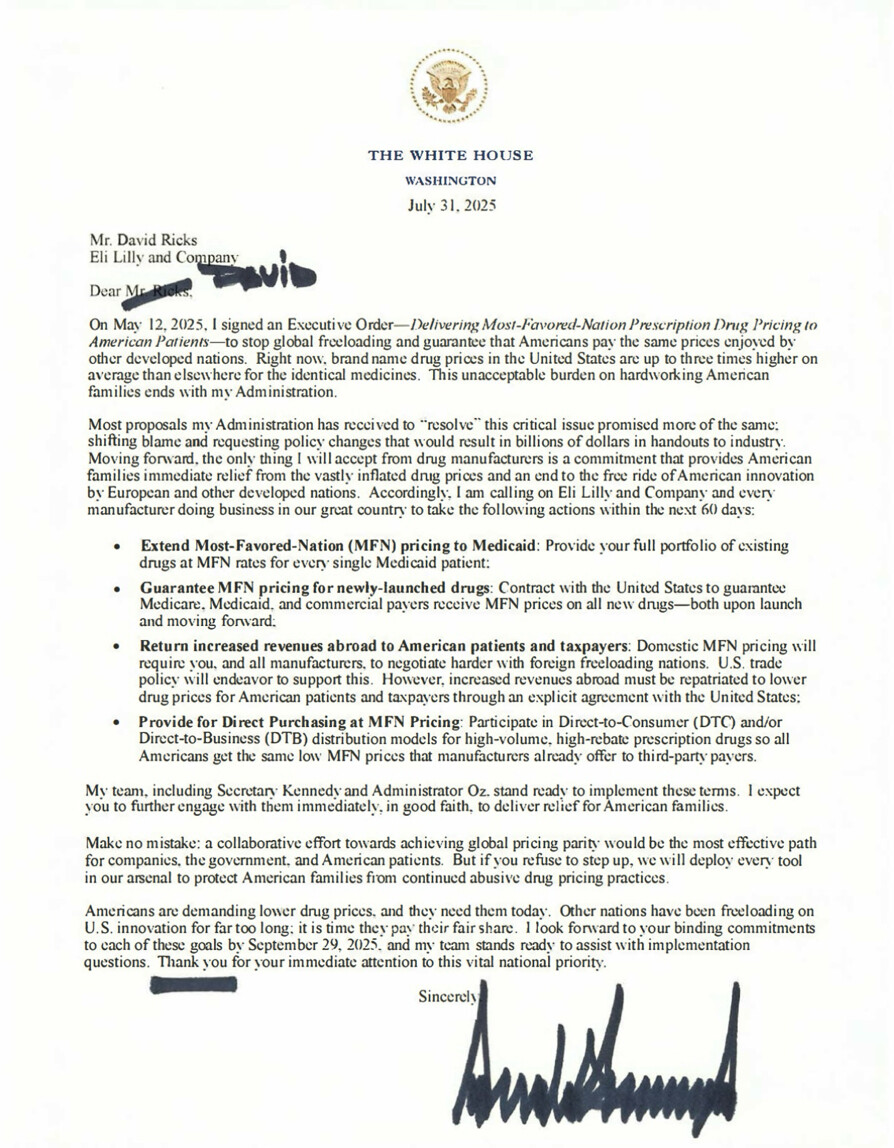
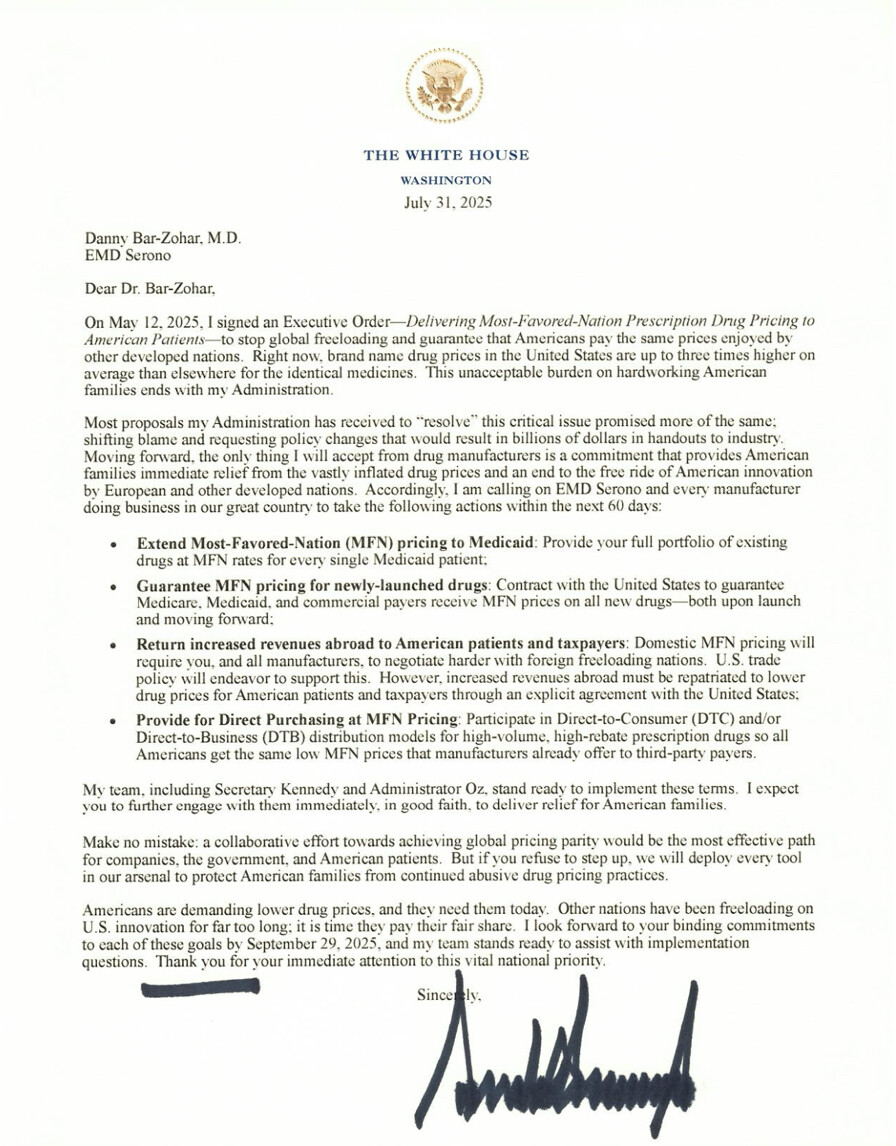
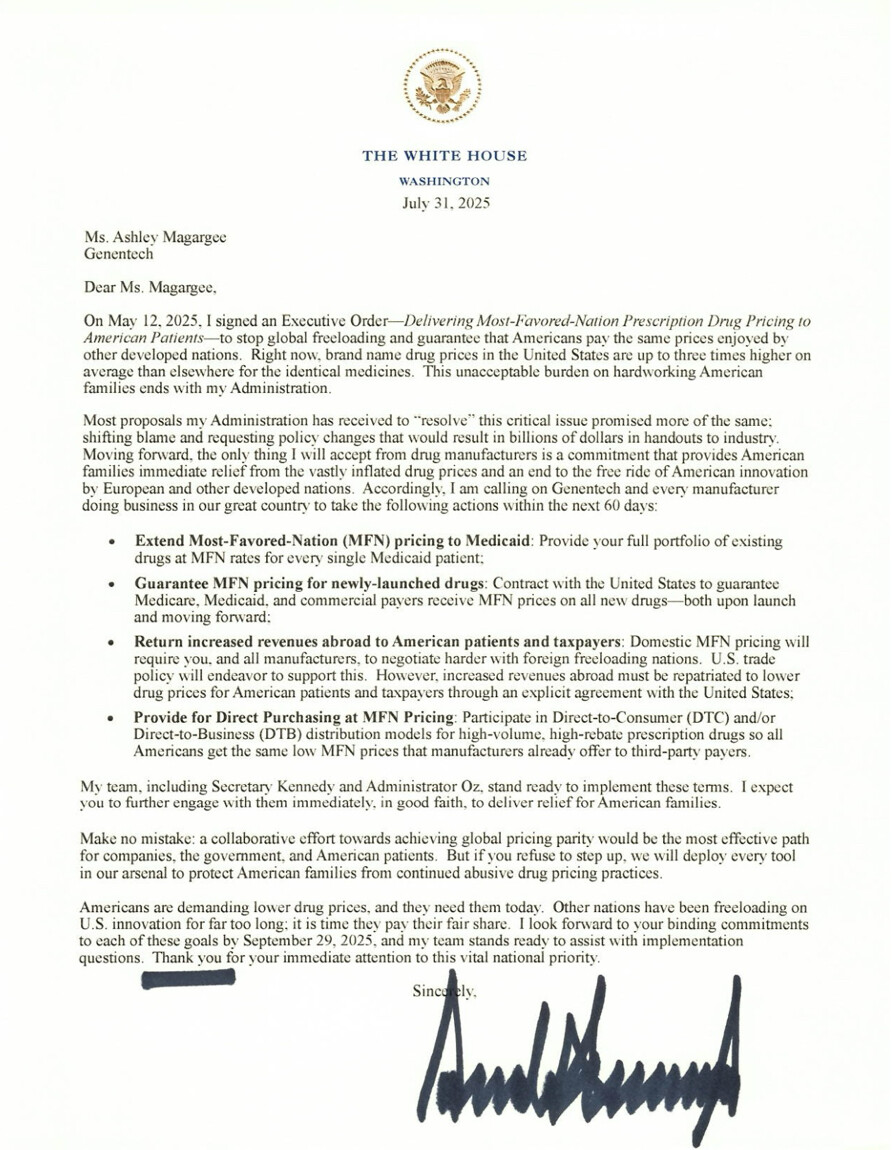







Health and Human Services Secretary Robert F. Kennedy Jr. and CMS Administrator Mehmet Oz are tasked with overseeing responses and implementation. Administration officials described the action as part of a broader campaign to end “global freeloading” on American pharmaceutical innovation.
The United States, representing less than 5% of the world’s population, currently accounts for an estimated 75% of global pharmaceutical profits. According to White House officials, this imbalance has made life-saving medicines increasingly unaffordable for U.S. patients.
Reaction from the pharmaceutical industry was swift. The trade association PhRMA denounced the letters, arguing that MFN pricing could damage R&D investment, restrict access to new therapies, and weaken the industry’s global competitiveness. Wall Street responded with caution, as shares of many targeted firms dipped after the announcement.
Some companies, such as Pfizer and Bristol Myers Squibb, have already begun rolling out direct-to-patient programs for key medications in what may be seen as a partial concession to public and political pressure.
Americans should not pay more than anyone else in the world for the same medicine,” the President stated in the letter. “If these companies refuse to act, we will.”
The administration has made clear that this is not a request, but a deadline – with real consequences for noncompliance.
Top Questions & Answers: Trump’s 60-Day Drug Pricing Ultimatum
Q: What is the White House demanding from the 17 pharmaceutical companies?
A: The Trump administration is requiring each company to commit – within 60 days – to lowering U.S. drug prices to match the lowest prices paid in other developed countries. The demands include extending MFN (Most-Favored-Nation) pricing to Medicaid, guaranteeing it for new drugs, repatriating overseas profits, and offering select drugs directly to consumers or businesses at MFN rates.
Q: What happens if the companies don’t comply?
A: The White House has threatened strong enforcement actions, including regulatory penalties, trade-based measures, and expanded foreign drug importation to bypass domestic pricing structures.
Q: What is Most-Favored-Nation (MFN) pricing?
A: MFN pricing means U.S. drug prices would be capped at the lowest price that the same drug is sold for in other wealthy countries, such as those in Europe or Canada. The goal is to prevent Americans from paying significantly more than patients abroad.
Q: Which companies received the letters?
A: While the full list has not yet been officially published, confirmed recipients include AbbVie, Pfizer, Johnson & Johnson, Merck, AstraZeneca, Eli Lilly, Sanofi, Gilead, Amgen, Bristol Myers Squibb, Novartis, and several others—totaling 17 major pharmaceutical firms operating in the U.S.
Q: What is the deadline for compliance?
A: Companies must provide binding written commitments to the White House by September 29, 2025.
Q: How does this initiative tie into Trump’s previous policy efforts?
A: The letters are a direct extension of Executive Order 14297, signed on May 12, 2025, which mandates MFN drug pricing across federal programs and sets the foundation for broader pricing reforms targeting what the administration calls “global freeloading.”
Q: What has the industry’s reaction been so far?
A: Pharmaceutical companies and trade groups like PhRMA have expressed concern, warning that MFN pricing could harm innovation, reduce funding for new drug development, and lead to unintended consequences such as supply shortages.
Q: Has this approach been tried before?
A: MFN pricing has been proposed in the past but faced legal challenges and strong industry pushback. This is the most aggressive and coordinated attempt to date, involving direct outreach to company leadership and a firm deadline.
Q: Will patients see immediate savings?
A: That depends on whether companies comply and how pricing changes are implemented. If enforced successfully, MFN pricing could lead to substantial cost reductions on commonly used drugs – but timelines may vary.
Q: Is congressional approval required for this policy to take effect?
A: No. The Executive Order and letters are being executed through administrative authority. However, full-scale implementation may face legal and political hurdles if challenged in court or Congress.


